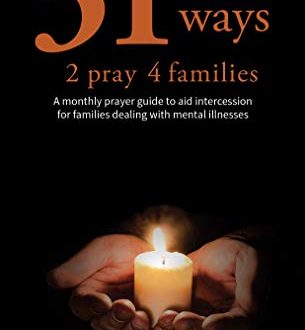The (Not So) Secret to a Happy Marriage
Last week while waiting in the hall for someone from Dallas’s Criminal Court 5 to call me in, I had a long conversation with a fellow juror—a younger single woman who self-identified as a Messianic Jew (Christian). When she learned I had been married thirty-two years, she was intrigued.
“From the way you describe it,” she said, “you seem to really enjoy being around your husband.” She sounded surprised. “So what’s your secret? What made it work for you?”
My first answer was genuine, but sadly she didn’t believe me. See, I told her that having Jesus Christ at the center of our relationship was the strongest glue. And I didn’t mean it to sound spiritual or trite. The fact that my husband and I have a healthy respect for Christ means we know we must answer both to each other and to the omniscient One in our relationship. The grace we’ve received from the Father, the work of the Spirit, the knowledge of Jesus’ life and death and resurrection—these unite us as one. As the church father Tertullian wrote: “How beautiful, then, the marriage of two Christians, two who are one in hope, one in desire, one in the way of life they follow, one in the religion they practice. They are as brother and sister, both servants of the same Master. Nothing divides them, either in flesh or in spirit. They are, in very truth, two in one flesh; and where there is but one flesh there is also but one spirit.”
Despite my protestations, she couldn’t believe this was enough. She’d seen too many believers’ marriages end in divorce. (Sad, huh?) So she insisted on knowing “What else?” I elaborated on two specifics, but honestly, I believe they are part of the same answer.
First, we aren’t so sure about teaching that says women are made primarily for love and men, primarily for respect. If my husband had affection for me but refused to take my opinion seriously or consider my skills worth developing, I would feel patronized at best. If I respected but had no affection for him, our relationship would look more like a business contract than a one-flesh union. Sometimes Christians tend to focus so much on the apostle’s description of wives as “weaker vessels” in 1 Peter 3 (which I believe means “more physically vulnerable”) that we often miss the command in the preceding phrase “and treat them with respect.” God follows the admonition with a threat that he’ll shut his ears to husbands’ prayers if they diss their wives. Apparently respect in marriage is serious business. Women were made for it as much as men. And consequently my respectful husband has sacrificed himself to make sure I’ve received the education, affirmation, and opportunities needed to develop and use my spiritual gifts. He listens to me; he seeks my counsel. Conversely, I’ve sacrificed myself to make sure he’s received the education, affirmation, and opportunities necessary to develop and use his spiritual gifts. I listen to him; I seek his counsel.
And another thing—I told her that early on my husband modeled for me how to apologize. I had some growing to do in leaning to ask forgiveness when we married, because I disliked taking full responsibility for my actions. But if our relationship was going to work, there could be no more saying, “I’m sorry, if…” or “I’m sorry, but…” These I had to replace with “I’m sorry that…” We haven’t let the sun go down on our wrath, but that doesn’t mean we’ve always stayed up late at night to resolve conflict. It means we’ve mutually agreed on a time in the near future when we’ll resume the efforts to resolve things. And then we’ve kept our word. (We learned quickly that, despite good intentions, we resolved little after 1 AM.)
I could say more. But rather than talk about my own healthy (though imperfect, like all others) relationship, let me share some research-based data on marriage. The documented studies say these four destructo-patterns are most connected with marital failure: (1) Withdrawing—walking way when someone’s talking, or ignoring him or her—“talk to the hand”; (2) Escalation—“I’ve told you to take out the trash three times, and besides that YOUR MOTHER’S COOKING STINKS!”; (3) Negative Interpretation—“You bought me flowers, eh? What’d you do? Wreck the car?”; and finally, (4) Invalidation. “What do you mean ‘my driving makes you nervous’? I have a great driving record.” “It’s not cold in here—it’s your imagination.” “What a loser.”
The opposite of such patterns is both people being present and committed; giving gentle answers that turn away wrath; showing empathy—rejoicing with those who rejoice and weeping with those who weep; and assuming the best of someone. In short, living biblically.



10 Comments
Chrystal Westbrook Southwell
Thank you for sharing your
Thank you for sharing your personal experience of living out mutual submission in marriage. It IS sad that our divorce statistics send a message that following Christ doesn't positiviely impact marriage. I know there isn't just one reason for so many broken relationships, but I have to believe that broader teaching and understanding of mutual submission among Christ followers would be a good starting place to begin the healing.
Scott Ross
Love & Respect
I appreciate your post very much. Congrats on the 32 years. My wife and I are in year 18 and we feel like newly weds. You give us something to aspire to. 🙂
I mentor men all over the country and their role as husband is central to what I do. I agree that Christ being the center is the "secret." I also understand your point about women needing to feel that their input is taken seriously and men needing to feel affection.
I did want to just say a word in defense of the "Love & Respect" concept. The point isn't that men don't want love and women don't want respect. The thrust of the teaching is that respect is foundational for men while love is foundational for women, and that most conflict in marriage arises from that difference and/or one of the parties feeling slighted in that specific area. If a man is getting tons of love, but doesn't feel respected, he will react negatively. If a woman is getting tons of "respect" but doesn't feel loved, she will react negatively. And thus begins the "crazy cycle."
Once again, thanks for your post, and thanks for providing such a Godly example to all of us who want to bring glory to Christ by our marriages being a reflection of His relationship with His bride, the church.
Sandra Glahn
R-E-S-P-E-C-T
Scott, I applaud you for your work in affirming marriage in this world of un-affirmation. Eighteen years is no small feat.
As to our views on men and women, my hubby and I do believe in gender differences and in the complementarity of those differences. But what those exact differences are seems to mostly fall into the realm of mystery.
I used to say women were more relational than men until I visited countries where the men were much more relational than the women I knew in the U.S. And then I began to wonder if teaching people to pursue masculinity and femininity wasn't a distraction from telling them to pursue Christ and the fruit of the Spirit. It seems the gender stuff tends to fall into place when the Spirit issues (Jesus and love, joy, peace…) take center stage, and not vice versa. I mean, if women truly are more relational and are more gifted at verbal communication, one could argue they are more suited (on a creation level) for preaching and pastoring.
The argument we usually hear for men/repect and women/love goes like this (which I borrowed from a love/respect web site):
"Because Ephesians 5:33 reveals that a husband must love his wife and a wife must respect her husband, we see a distinction that is full of significance."
Yet elsewhere it's flipped; husbands are told to respect their wives (1 Peter 3:7) and wives are to love (phileo) their husbands (Titus 2:4). Yet no one makes a gender point about that.
Furthermore, the kind of love Paul's actually talking about when he tells husbands to love their wives (as in Eph 5:33 ) is agape, not phileo. So in the Book of Ephesians, Paul doesn't necessarily even have affection in mind. But he certainly does have self-sacrifice in mind.
If we try to assume gender norms from Bible stories and commands, we could conclude that because Jacob cooked stew and Jesus cooked fish and deacons in Acts 6 served widows' tables, men need to embrace their role of cooking and serving in the church. Hey, wait. Maybe there's something to that. JK 😉
Tina Vars
Thank you!
I really appreciated your article. I have not always "not let the sun go down on (my) wrath", unfortunately. I will have to remember to take that scripture more seriously.
Thank you for the tender reminders of how culture may dictate gender roles much more than we care to admit!
Sandra Glahn
Well Said
Tina, I appreciate so much your kind words, especially your transparency and teachability. I suspect your example will inspire others to search themselves and resolve to do the same.
Dave Grafe
What you said, Sandi!
Some years ago while seeking insight to improve my own marriage I read a book by a long-time relationship counselor who had, over the course of many years, accumulated a great deal of information about what men and women are looking for, information gathered through countless workshops with thousands of couples across the country. In each workshop the men and women had been separated into small focus groups of like gender and had been asked to identify the traits that were most important to them in a life partner. The initial, culturally-driven expectation was that most men wanted "a total babe" and that the majority of women wanted "a dependable breadwinner" but the actual answers given were quite surprising. Yes, these stereotypical traits did show up, but they were in the bottom 10% of the total answers given.
Overwhelmingly the men said they wanted a woman who would trust them to make good decisions, while the women universally wanted a man who would be present and listen to (and remember!) what they had to say.
When I read this I thought "Of course!" but then I began to wonder if in reality we are not all genetically predisposed to failure. I mean, think about it, every woman alive remembers being a teenaged girl, surrounded by absolutely clueless boys, clearly years behind the girls in maturity, behavioral intelligence and general insight, and what quantum event has ever occured to change that perspective? Why none at all of course, so what evidence is there that men have a clue as adults?!!
Meanwhile, evey man has grown up listening to the same girls talk ALL DAY LONG about hair and clothes and makeup and movie stars who was going out with whom and other fluffy stuff that was completely superficial to boys trying to figure out how to make money, buy a car, dial in a career, excel at something substantial and make a meaningful mark in society – you know, MEANINGFUL subject matter. For them, too, nothing hs ever happened to challenge that early assessment, so why should they ever consider that the women have anything to say years later that warrants stopping what they are doing (or thinking) to listen? Like I said, we are genetically set up to miss the boat!
In a nutshell, for both genders it cuts against the grain of our actual experience to meet the expectatins and aspirations of our opposites, but without mutual reassessment and loving submission on a daily basis we are all doomed, for successful co-existence requires constant re-examination, total and unconditional dedication and appreciation of something far greater than ourselves!
jcramer
Marriage
Sandi,
This was such a good post. I've said many times, "I want what Sandi and Gary have!" And it's primarily because I've never seen two Christian people have so much respect for EACH other. Julie
Carrie Patterson
Marriage
Sandi, I was thinking about today being your anniversary and started counting the years. I suddenly realized that it really HAS been 32 years. I really appreciate what you have written. I have watched your marriage grow and I know that you have had times of sorrow and times of joy, but rather than allow those times to pull you apart, you and Gary have chosen to draw together, relying on God for your strength. I will never forget something you told me when you were enduring infertility testing. Couples in that situation often go in divergent directions, but you told me that Gary had said, "I married you because I love you, not just so you could bear children". I thought he was an amazing man if he could love you so selflessly.
Jasmin
My view of respect is very different than that of my husband’s.
Hi, I really need help 🙁
I have always thought that I am respectful to my husband but he says he doesn't feel that way. He says that I am supposed to do anything he says even when I don't agree. I feel that I have to do what he says, most of the time, but I get very resentful when I have to "follow" his lead when I know he is being unreasonable and unfair. I feel that we are oil and water and I really can't see the door to the exit of this horrible nightmare. We argue all the time and underneath most of the fights is the topic of disrespect. He has even talked about divorce a couple of times during fights and that really hurts me. I have always believed that we can work through anything with God's help, but I guess my husband is loosing his faith in me more and more every day. How can I do something that makes me feel undermined? Sometimes I just try to swallow my pride and do what he wants but he can tell that I am not on board and feels angry at me anyway. The Bible says that I have to obey my husband, I know it is true but the way I was raised might be getting in the way and I don't understand how to do what my husband says from the bottom of my heart when I disagree. I kind of think that we need to agree on what needs to be done, he agrees on that, but he thinks he has the final answer at the end of it all and when we don't agree it is so hard to follow. I try to "pick up my fights" and just object about things that seem completely unrealistic and unfair to me, but at this point I can't disagree about anything or it is held against me. Plese, help me with advise. I'll be always grateful.
Sandra Glahn
Submission is not the same as obedience
Dear Jasmine,
First of all, I'm so sorry for what you're going through. It must be heartbreaking.
You say that your husband believes you are supposed to do anything he says even when you don't agree. If so, he has a misguided understanding of what it means to be husband and wife. A woman who truly cares about her husband should have some stress going on inside if she knows her man is being unreasonable and unfair. Doesn’t God call all of us to do justice?
I urge you to take another look at the Bible. You say it tells you that you must “obey your husband.” But actually Paul and Peter talk about wives submitting, and Peter purposely says “submit” for wives as opposed to “obey” for slaves and children. What that means: You are not in some unilateral hierarchy (as are slaves and children). You are in a partnership, bone of bone, and flesh of flesh. And the goal of your marriage is oneness. That means a meeting of the minds. Shared goals. Going in the same direction. You are equals, and in the picture Paul paints in Ephesians 5, you submit. But he does not say the man makes the final decision to have his way. It says he lays down his life, as Christ did for the church.
You’re in a no-win situation here. If you do what is unreasonable, you feel resentful. If you swallow your pride and do what he wants, he’s angry because he senses you are not on board. The solution is certainly not for you to bury your brain and quit being a partner. But it’s also not for you to go quote scripture to him about how he must lay down his life.
Here’s what I suggest.